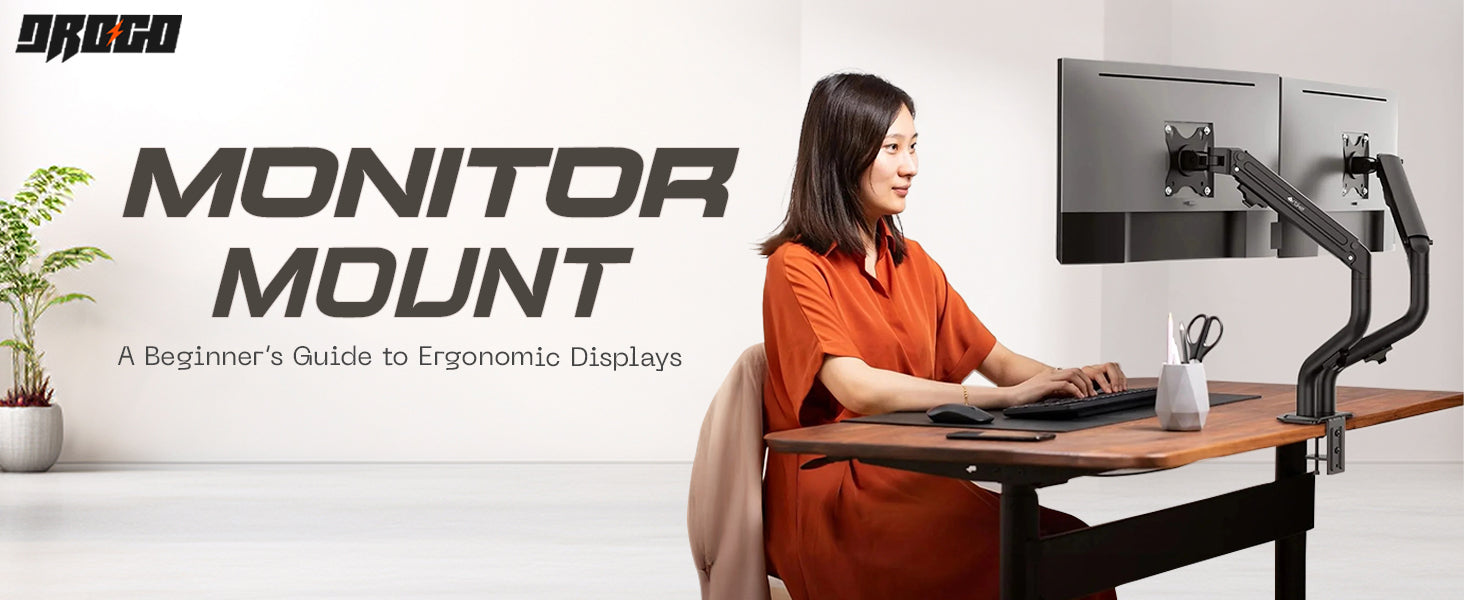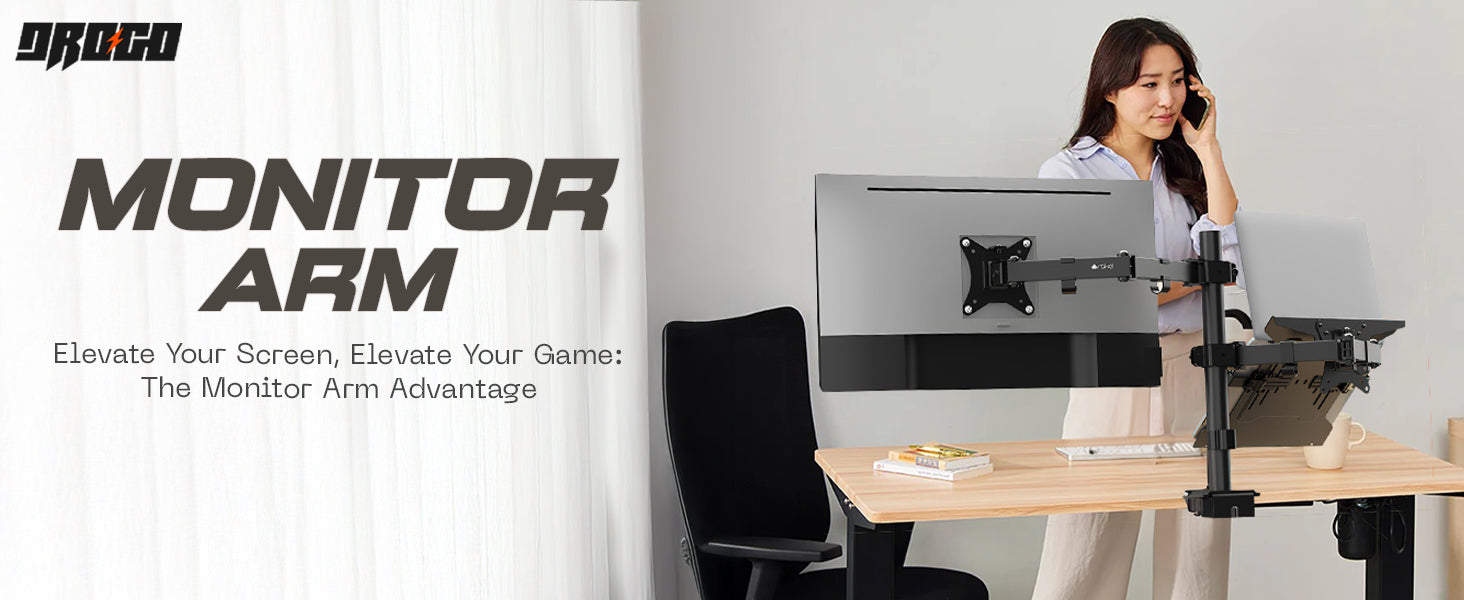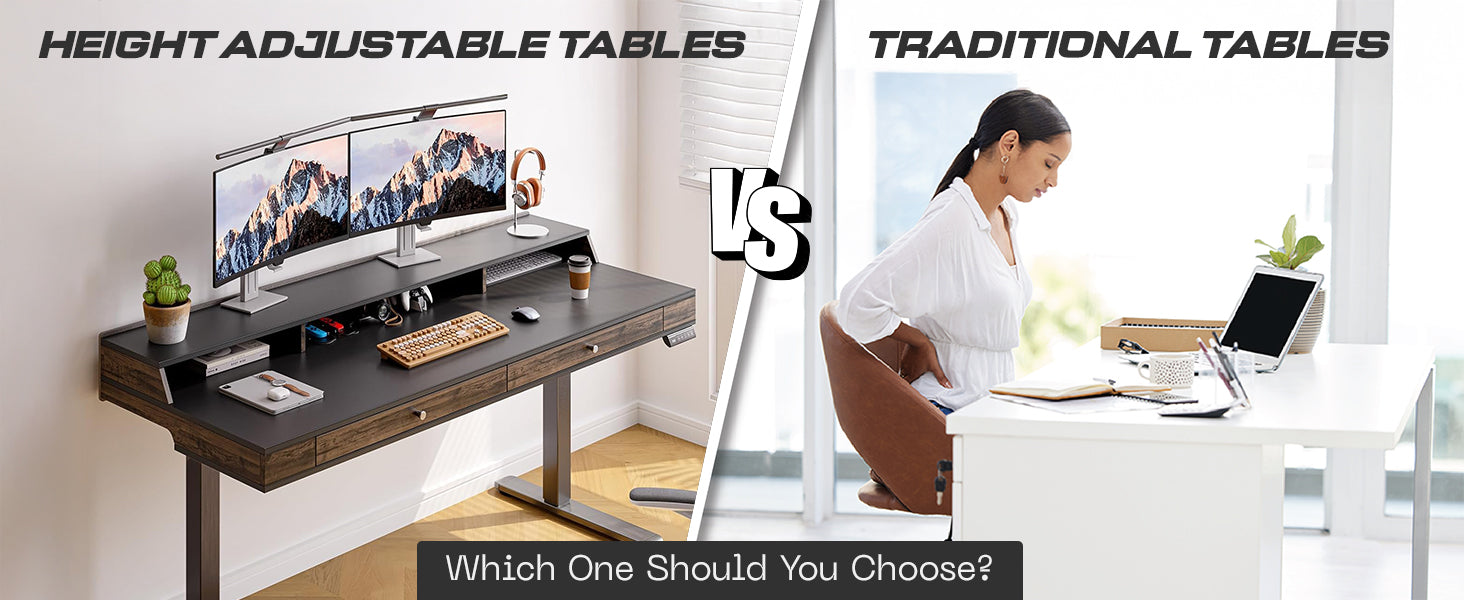In these days’s virtual age, most folks spend long hours in front of laptop screens whether or not at work or at domestic. But did you understand that the manner your display is positioned can affect your posture, consolation, and even productiveness? That's wherein monitor mounts come into play. These ergonomic add-ons are designed to help you optimize your workspace, reduce neck and eye strain, and make your setup look smooth and expert.
If you’re new to the idea of display fingers, stands, or wall mounts, don’t worry this amateur-pleasant guide will walk you through the whole lot you need to realize. From the exceptional varieties of mounts available to their blessings and installation suggestions, we’ve got you included. Let’s dive in and assist you rework your desk into an ergonomic, efficient area.
What is a Monitor Mount?
A reveal mount is a device that holds your pc screen in place, allowing it to be lifted, tilted, swiveled, or turned around primarily based to your wishes. Unlike conventional monitor stands that include your screen, mounts give you flexibility and freedom to customise the display function for higher ergonomics.
Monitor mounts are usually attached in one of 3 methods:
-
Desk Clamp: Clamps to the threshold of your desk.
-
Grommet Mount: Installed through a hole in your desk.
-
Wall Mount: Secures the monitor directly to a wall.
These mounts support single or multiple monitors and come with adjustable arms or fixed brackets. The key to choosing the right one lies in your workspace layout, screen size, and how much movement you require.
Types of Monitor Mounts
There are several types of monitor mounts to choose from depending on your needs:
a) Single Monitor Mounts
Ideal for a minimalist setup. Provides complete adjustability tilt, swivel, rotate, and height regulate.
b) Dual Monitor Mounts
Supports two monitors. Perfect for multitaskers, coders, gamers, or designers.
c) Triple/Quad Monitor Mounts
Great for professionals like stock traders or content creators who need multiple displays.
d) Wall-Mounted Monitor Brackets
Saves table area. Ideal for home workplaces or entertainment facilities. Fixed or articulating versions are available.
e) Freestanding Monitor Mounts
Doesn’t need to be clamped or drilled. Good for temporary or rental setups.
f) Laptop + Monitor Mounts
Holds a laptop and a monitor side by side great for hybrid users or dual-device workers.
Each kind caters to a special workflow. If your activity calls for frequent screen adjustments, an articulating arm is higher. If you’re aiming for a clean, everlasting setup, a wall mount is probably perfect.
Why Use a Monitor Mount?
Monitor Mount is not just aesthetics they provide real health and productivity benefits:
➤ Ergonomics & Comfort
You can place the screen at eye level, reduce the tension of the neck and fatigue on the shoulder. This is important for long work sessions.
➤ Improved Posture
Poor monitor placement leads to cabining or tapping. A mounting helps to promote a neutral spine position.
➤ More Desk Space
By retrieving the screen from the desk, inching space for writing, accessories or more devices.
➤ Flexibility & Adjustability
Most mounts provide 360 ° rotation, tilt, swivel and height adjustment - perfect for dividing the screen during meetings or to switch between tasks.
➤ Productivity Boost
Multimonator setup driven by Mount allows fast multitasking, reduces window switches and streamline workflows.
➤ Cable Management
Many mounts include the built-in cable routing systems to arrange the wires systematically and visually.
Whether you're working, gaming, or editing videos, monitor mounts make a noticeable difference in your setup’s efficiency and comfort.
How to Choose the Right Monitor Mount
Before buying Mount, consider these most important factors:
➤ Monitor Size & Weight
Always check supported screen size and weight on the fastener. Your monitor should be within the specifications.
➤ VESA Compatibility
VESA is a standard growing hole pattern used by most screens. Normal size is 75x75 mm and 100x100 mm. Make sure the screen and mounting match.
➤ Mounting Method
Do you want to drill in the wall? Or use a squeeze? Choose a mounting style corresponding to your desktop or scope.
➤ Adjustability
Do you need more freedom of movement? Go for a completely articulating arm. For static layouts, some mounting may be sufficient.
➤ Number of Screens
Do you use two or more screens? Look for double or triple mounting with independent hand movement.
➤ Cable Management
Some mounts feature built-in cable routing, which holds things streamlined and reduces wear on the wires.
➤ Budget & Brand Quality
Trusted brands like Ergotron, AmazonBasics, North Bayou, and Drogo offer reliable build quality and warranties.
Investing in the right monitor mount can save you from neck pain and workspace clutter down the line.
How to Install a Monitor Mount
Installation is generally straightforward but varies by mount type.
For Desk Clamps:
-
Attach the clamp to the edge of your desk.
-
Tighten the screw for a secure grip.
-
Attach the monitor to the arm using VESA screws.
-
Adjust tension and screen height as needed.
For Wall Mounts:
-
Use a stud finder to locate wall studs.
-
Mark drill points based on the VESA pattern.
-
Drill holes and insert anchors or screws.
-
Mount the bracket and attach your monitor.
Pro Tips:
-
Always read the user manual.
-
Use a level tool to ensure the monitor sits straight.
-
Double-check monitor weight before mounting.
-
Get help if you're unsure some mounts can be heavy.
Once set up, test all angles and movement ranges. You’ll likely notice an immediate difference in how comfortable your setup feels.
Common Mistakes to Avoid
Even with the best gear, mistakes happen. Here are a few to watch out for:
-
Ignoring VESA specs: Don’t assume all monitors are compatible.
-
Overtightening screws: This can damage the monitor or mount.
-
Wrong weight rating: Using a mount not rated for your screen can cause it to fall.
-
Improper wall anchoring: Especially for drywall always use proper tools and supports.
-
Neglecting ergonomics: Don’t just mount the monitor make sure it aligns with your eyes and posture.
Avoiding these errors ensures your mount stays secure and delivers maximum comfort.
Declaration
Monitor mounts might seem like a small improve, however they are able to completely remodel your workspace. From enhancing posture and lowering pressure to enhancing productivity and saving desk space the advantages are actual and great.
For novices, understanding the fundamentals like types, adjustability, compatibility, and installation facilitates in making the proper selection. Whether you work at home, sport for hours, or need a smooth setup, there is a screen mount answer watching for you.
As screens get larger and workstations emerge as greater complicated, investing in an ergonomic show setup isn’t simply clever it’s important.
Ready to upgrade your workspace? Start with a monitor mount and feel the difference.







